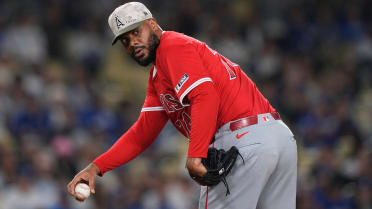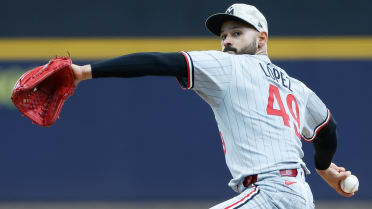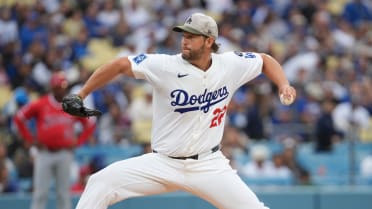HOUSTON -- The Astros are the ultimate “pass the baton” team. Just ask Adam Wainwright, who made that reference most prominently from the broadcast booth during Houston’s dominant victory in the American League Division Series.
They are also perhaps the most unforgiving team left in these playoffs, with a long track record of exploiting just about every mistake and weakness.
Just look at how the Astros handled the White Sox and their best rotation in baseball. Lance Lynn couldn’t sneak a fastball by them. Dylan Cease didn't get out of the second inning. Carlos Rodón put too many baserunners on by nibbling around the plate.
The Astros made it this far for countless reasons, but a case could be made that it’s their offensive resilience that has been the most significant cause.
“Our one-through-nine hitters and the guys coming off the bench are well-prepared, and we're all really good hitters,” Astros outfielder Kyle Tucker said. “You can't just take [Jose] Altuve as an easy at-bat or [Michael] Brantley or [Carlos] Correa. You’ve got to work through our lineup. Our lineup is really deep. Everyone can really hit, and we have a lot of preparation going into each game and each series.”
How will all this factor into their next matchup against a Red Sox club that comes into Houston red-hot?
What are Boston’s weaknesses?
Two stand out most: defense and relief pitching.
Boston ranked last this year with minus-38 Outs Above Average, per Statcast. Other advanced metrics were a little kinder -- FanGraphs had the Sox with a minus-5.1 ultimate zone rating and plus-two defensive runs saved, which both ranked 19th -- but the picture is far from rosy.
Kyle Schwarber has poked fun at himself for his struggles at first base, Rafael Devers had 22 errors at third base, six more than any other at the hot corner, and while Xander Bogaerts is arguably the Red Sox's most athletic player, his range is far from the level of that of Carlos Correa. Boston’s shortstop was worth minus-10 OAA compared to Correa’s plus-12.
“As for Kyle, we knew the first base thing was speculative,” Boston chief baseball office Chaim Bloom told MLB Network on Wednesday. “Obviously, some days have been better than others over there. He has a good sense of humor about it, as you guys saw during the Division Series.”
Boston’s bullpen has held opposing hitters to a .243 on-base percentage this postseason, which trails only the Dodgers. But in the regular season, the Red Sox had 10 losses when leading after seven innings, the most in the AL, and they also blew two such leads against the Rays in the ALDS before coming back to win each, in Games 3 and 4 -- both of which required walk-offs for Boston to prevail.
How can Houston exploit those weaknesses?
With the same formula that got it here: patience and persistence.
At nearly each of Chicago’s hiccups in the ALDS, Houston had an answer. The Astros trailed five times in that four-game series and reclaimed all but one of them -- including 10 unanswered in the series-clinching win. Houston had 10 wins in the regular season when trailing entering the seventh inning and 10 when trailing going into the eighth. Only the Rays, with 12 such wins, had more victories among AL teams when behind entering the eighth inning.
“This should be an offensive series,” Astros manager Dusty Baker said. “You are going to have to play them all the way down to the end. You're never out of a game. You're going to have to add on when you need to add on, and you never know which run is going to be the final run that's going to be the winning run.”
Houston also had a .754 OPS after the seventh inning, fourth best in the Majors, and in those innings were worth 109 wRC+ (league average is 100), tied for second. It speaks to their successes against relievers. And though Red Sox manager Alex Cora likely would’ve had each of his starting pitchers available in relief for these first two games at Minute Maid Park anyway, this specific opponent seems to warrant such a strategy.
Chris Sale will take the hill in Game 1 and Nathan Eovaldi will start Game 2. The rest of the rotation -- Nick Pivetta, Eduardo Rodriguez and Tanner Houck -- will be with the relievers.
“It's not a five-game series, so you have to be very careful with the way you use your bullpen,” Cora said. “You have to be on point. If you are going to be aggressive the way we're going to be -- and I do believe the structure is going to help us to use some guys tomorrow if we need them. … But if we need to go to Nick or Eduardo, Tanner, obviously, we are going to be aggressive, and this is the best way for us to structure the series.”
Does the Astros’ approach change?
Houston isn’t living by the long ball like it has in the ALCS each of the previous four years. Rather, constant contact and relying on pitchers’ mistakes have largely driven the Astros' lineup.
When Houston hitters swing, they connect 80.6% of the time, far and away the Majors’ best rate. And when opposing pitchers come in the strike zone, the Astros whiffed just 9.5% of the time, also best in MLB. For these reasons, they struck out at the lowest rate of any team, too.
They’ll certainly scout Boston’s pitching staff aggressively, but they’re not going to steer from what got them here.
“We go over each individual guy's preparation,” Tucker said of Boston’s arms. “We'll probably do something today and especially something tomorrow before just to go over who is the starters and what guys are most likely to come in and what situations and who we're most likely to see. … We’ve just got to come out with the same attitude and aggressiveness that we did against the White Sox, because they were a great pitching staff, too. And we have to continue to put up a lot of runs and play defense and play a complete game.”
Daniel Kramer covers the Mariners for MLB.com.





